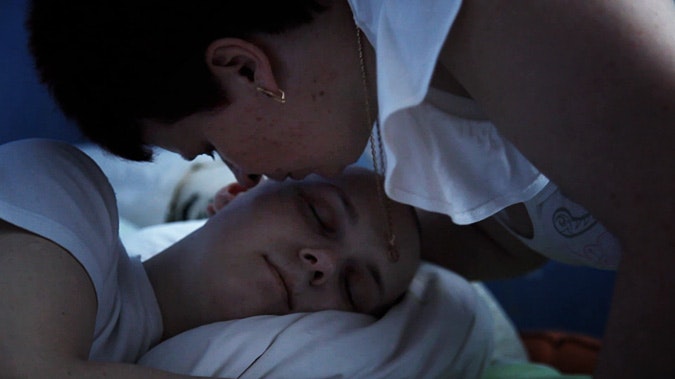Ten Days with Vlad and Nadia
By Pamela Chen

In the spring of 2010, documentary filmmakers Scott Anger and Bob Sacha traveled to Ukraine for the Open Society Foundations to report on access to pain relief in end-of-life care: while late-stage cancer patients in other countries might get 2,000 milligrams or more of morphine per day to manage their pain symptoms, patients in Ukraine are only allowed 50 milligrams per day.
The two filmmakers met Vlad Zhukovski, 27, and his mother Nadia in the small town of Cherkasy. Vlad was suffering from incurable brain cancer. Despite desperate pleas to doctors and nurses, Nadia was unable to obtain enough medication for her son, while Vlad’s deteriorating condition left him continuously tormented in pain.
Bob Sacha remembers first learning of Vlad’s young age. “I thought about all the things I had done since I was that age—silly, simple things—and I realized that not only would Vlad be unable to do those type of things, but he’d also needlessly suffer in pain until the day he died. No one should ever be sentenced to that future.”
What Vlad and Nadia were going through was familiar to many families in Ukraine, yet remained largely unheard of in countries where pain relief is a reality. Scott Anger describes meeting Nadia for the first time over tea in her kitchen, explaining why they had come to tell their story, but also what the process would require:
“As documentary filmmakers, our desire is always to truthfully witness and record events as they unfold, which means we’re shooting all the time. Nothing is setup or staged. Our goal is to eventually become invisible so people are comfortable enough to go about their daily lives. Once we explained to Nadia and Vlad why we were there and what we wanted to do, they agreed. From that point forward, we filmed nearly every aspect of their lives.”
Scott and Bob spent the next ten days with the family. “Vlad was a thoughtful, caring and funny person. Even when he was in a lot of pain, he asked about our comfort and needs,” Scott recalled. “For the most part, we became part of the environment. Then Vlad would be getting bandages changed by his friend Sergey or having a conversation with his mom when he’d suddenly turn and ask how we were doing. He cared about all the people around him. Sometimes, he joked about how we’d wait frozen in position for a long time in order to get just the right angle or shot.”
As their relationship with the family continued to grow, the filmmakers were drawn into their private world. Bob describes Nadia’s struggle to care for her son, not only in her day-to-day care-giving but in navigating the daunting bureaucratic obstacles.
“After getting the runaround on the phone, Nadia decided she might have better luck if she personally went to the hospital to find a doctor to come and see Vlad,” Bob says. “I can still remember the way she would walk with these determined strides, the click, click, click of her heels on the pavement. It was incredible to watch her fight for her son, to keep politely pushing and pushing until someone would pay attention. I am in awe of her. She devoted her life to Vlad, to try to get him better care, to try to get him more medication to ease his suffering.”
When it was time to leave, the unspoken truth brought with it a weight of finality. "Most of the time you know you'll see someone again someday, somewhere. But we were pretty sure that we weren't going to see Vlad again, that he was not going to get better," said Bob.
"Despite the intolerable pain and health problems, we never witnessed him losing hope," Scott added, "And we returned home to the task of telling his story in a truthful, powerful way that honored Vlad's value for life."
Fifty Milligrams Is Not Enough is one in a series of three short films documenting human rights abuses in health care settings. Watch the films and learn more about the Campaign to Stop Torture in Health Care.
Film Credits
Fifty Milligrams Is Not Enough
A Film by Scott Anger and Bob Sacha
Produced by the Open Society Foundations
Producers: Paul Silva and Pamela Chen
Editor: Scott Anger
Design: Mike Schmidt
Translator: Eugenia Larionchik
Transcription: Irina Zaytseva
Special Thanks: The Zhukovski Family, Dr. Irina Shlyaga, Sergey Psiurnyk
Until December 2011, Pamela Chen was a senior communications coordinator at the Open Society Foundations.